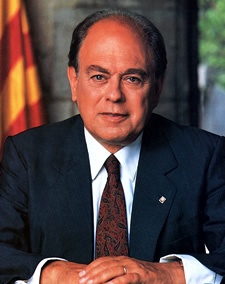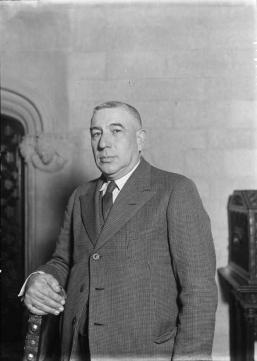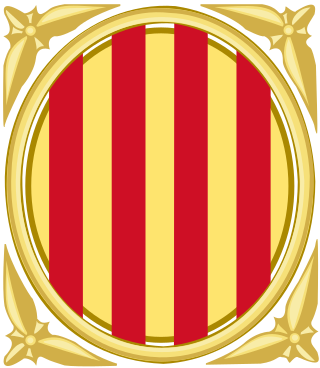
Catalonia is an autonomous community of Spain, designated as a nationality by its Statute of Autonomy. Most of its territory lies on the northeast of the Iberian Peninsula, to the south of the Pyrenees mountain range. Catalonia is administratively divided into four provinces or eight regions, which are in turn divided into 42 comarques. The capital and largest city, Barcelona, is the second-most populated municipality in Spain and the fifth-most populous urban area in the European Union.
Generalitat is the name of two major medieval and early modern political institutions and their modern-day analogues in Kingdom of Spain. The ancient Principality of Catalonia and the Kingdom of Valencia were ruled by Generalitats. Today, Catalonia and The Valencian Community have systems of self-government called Generalitats, and are two of 17 autonomous communities of Spain. The term is also used for the government of the semi-autonomous comarca of Val d'Aran, the Generalitat a l'Aran.

Francesc Macià i Llussà was a Catalan politician who served as the 122nd president of the Generalitat of Catalonia, and formerly an officer in the Spanish Army.
The Generalitat de Catalunya, or the Government of Catalonia, is the institutional system by which Catalonia politically organizes its self-government as an autonomous community of Spain. It is formed by the Parliament of Catalonia, the Presidency of the Generalitat de Catalunya, and the Executive Council of Catalonia. It is ruled according to the Statute of Autonomy of Catalonia.
The Republican Left of Catalonia is a pro-Catalan independence, social democratic political party in the Spanish autonomous community of Catalonia, with a presence also in Valencia, the Balearic Islands and the French department of Pyrénées-Orientales. It is also the main sponsor of the independence movement from France and Spain in the territories known as Catalan Countries, focusing in recent years on the creation of a Catalan Republic in Catalonia proper. Its current president is Oriol Junqueras and its secretary-general is Marta Rovira. The party is a member of the European Free Alliance.

Jordi Pujol i Soley is a retired Catalan politician who was the leader of the party Convergència Democràtica de Catalunya (CDC) from 1974 to 2003, and President of the Generalitat de Catalunya from 1980 to 2003.

Josep Irla i Bosch was a Catalan businessman and politician. He was a deputy in the Parliament of Catalonia and the Spanish Congress in 1932, as an Esquerra Republicana de Catalunya affiliate. He was also the last President of Parliament of Catalonia at the end of Republican Catalan resistance in the Spanish Civil War, before Francisco Franco abolished the Generalitat of Catalonia. He was elected President of the Parliament of Catalonia on 1 October 1938. In office, Irla pushed for cooperation with the allies, Basque nationalists and other anti-Francoist groups, though excluding the communists. He became the President-in-exile of the Generalitat after Lluís Companys was executed. During his time as President-in-exile, he established a Government in exile, and appointed Josep Tarradellas as Conseller en Cap. He resigned as President in 1954.

The Executive Council of Catalonia or the Executive Government of Catalonia is the executive branch of the Generalitat of Catalonia. It is responsible for the political action, regulation, and administration of the government of the autonomous region.

The Parliament of Catalonia is the unicameral legislature of the autonomous community of Catalonia. The Parliament is currently made up of 135 members, known as deputies, who are elected for four-year terms or after extraordinary dissolution, chosen by universal suffrage in lists of four constituencies, corresponding to the Catalan provinces. The Parliament building is located in Ciutadella Park, Barcelona.

The president of the Government of Catalonia is head of government of Catalonia, leading the executive branch of the Generalitat de Catalunya, the Catalan government.
The Institut Ramon Llull is a consortium consisting of the Generalitat de Catalunya,, the Govern de les Illes Balears and the Ajuntament de Barcelona. Its purpose is to project and disseminate abroad Catalan language and culture in all of its forms of expression. To do this, the Institut Ramon Llull provides support for external relations in the cultural ambit of its member organisations.

The following outline is provided as an overview of and topical guide to Catalonia:

Plataforma per la Llengua is a non-governmental organization born in 1993 in Barcelona, in order to defend and promote the Catalan language all over the Catalan-speaking territories in the European states where it is spoken: Spain, France, Andorra and Italy. Their activities include the development of sociolinguistic studies and a constant monitoring on the status of Catalan, in collaboration with other organizations, foundations and public agencies. While based in Barcelona, it has delegations in Valencian Community, Alghero and in several Catalan regions. Moreover, Plataforma per la Llengua works together with some Northern Catalonia, La Franja, Andorra and Balearic Islands organizations. There are many aims; one of them is to guarantee the linguistic rights of Catalan-speaking people and the use of Catalan as a connection tool in the fields and territories where it is spoken.
The Statute of Autonomy of Catalonia of 2006 provides Catalonia's basic institutional regulations under the Spanish Constitution of 1978. It defines the rights and obligations of the citizens of Catalonia, the political institutions of the Catalan community, their competences and relations with the rest of Spain, and the financing of the Government of Catalonia.

The Catalan Way, also known as the Catalan Way towards Independence, was a 400-kilometre (250 mi) human chain in support of Catalan independence from Spain. It was organized by the Assemblea Nacional Catalana (ANC) and supported by 14 nongovernmental groups. It took place in Catalonia on 11 September 2013, which is the National Day of Catalonia, known as Diada. Catalonia's Department of the Interior estimated the number of participants at about 1.6 million. The human chain followed the ancient Via Augusta, from Le Perthus up to Alcanar. According to Carme Forcadell, president of the ANC at that time, it was "a symbol of the unity of Catalan people to achieve national sovereignty".

The Statute of Autonomy of Catalonia of 1932, also called the Statute of Núria, was the first implemented statute of autonomy for Catalonia, officially providing self-government to Catalonia for the first time in more than 200 years. The Statute was promoted by the then acting President of the Generalitat, Francesc Macià and approved in a referendum by 99% of Catalan voters. The draft Statute was completed on 20 June 1931 in Núria and finally approved in the Spanish Parliament on 9 September 1932. It was implemented until the occupation of Catalonia by the Nationalist Army during the last stages of the Spanish Civil War, in 1939.

The Catalan Republic was a state proclaimed in 1931 by Francesc Macià as the "Catalan Republic within the Iberian Federation", in the context of the proclamation of the Second Spanish Republic. It was proclaimed on 14 April 1931, and superseded three days later, on 17 April, by the Generalitat de Catalunya, the Catalan institution of self-government within the Spanish Republic.

Ernest Maragall i Mira is a Spanish economist, politician, member of the Parliament of Catalonia and former Minister of Foreign Action, Institutional Relations and Transparency of Catalonia. He was previously Minister of Education, a member of the European Parliament and a member of Barcelona City Council (BCC).

The Autonomous Region of Catalonia was established after the grant of self-government to Catalonia during the Second Spanish Republic (1931–1939), becoming an autonomous region within the Spanish Republic. The Generalitat of Catalonia was the institution in which the autonomous government of Catalonia was organized, it was established in order to replace the Catalan Republic proclaimed during the events of the proclamation of the Spanish Republic.












